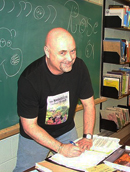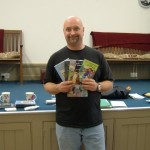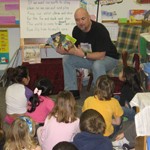FAQ
 How long does it take to write a book?
How long does it take to write a book?
It depends on the book really. I have a huge ideas file and some are no more than a title, a sentence, or a paragraph, others are more developed. Once I sit down to write the novel, I like to create a plan, including a chapter by chapter outline, even if some chapters are more developed than others. Very often the rest of the story comes to me once I start writing.
A novel can be completed in five or six weeks, at least in a basic form. This would be the first rough draft of the text. I would then begin making revisions, even deleting some portions altogether. If things aren’t coming together, it’s often best to leave the story for a while. Take a break, do something else and come back to the project with a fresh attitude. I may then work on different sections individually. Altogether, before the publisher and editor add their suggestions, it would be a five or six month process.
How do you write?
I do most of my work on the computer, but also use pen and paper, particularly when making revisions, edits or developing an outline. All stories have a beginning, middle and an end, but that doesn’t mean they have to be written in that order. As the first few pages are the hooks that get the reader into the story, they’re often one of the last parts written. Similarly, the ending has to be effective, particularly for a book that has sequel potential.

Where do you get your ideas?
Anywhere and everywhere. Out walking the dog, in the car, something in a conversation, a newspaper story, a billboard, an item on the evening news, books, historical events, other people’s stories, movies, or something out of the blue. I often find myself wondering ‘what if?’ Sometimes the challenge is to stop having ideas. Some may never be used, but I try to record as many as I can. I never know when they might fit in with a story I’m writing. Even ideas that don’t seem to work right away may have a use in the future.
Why do you write for children and not adults?
I have many story ideas for adults and a few screenplays with older viewers in mind. However, the best thing about writing for children is that it allows me to write about the kinds of things that used to fascinate me when I was young. I often think I write for the boy I was aged about nine or ten years old. For most of us, it’s a lost, magical time before we grew up. Even if we have children of our own, it’s difficult to remember just how things felt when we were young. And of course, the stories can be very imaginative if they’re for children, which makes writing them so much fun.
Are all your stories in the science fiction or fantasy genre?
I don’t really think of myself as being in any particular pigeonhole. One of the best things about science fiction or fantasy is that more or less anything you can imagine is possible. I draw inspiration from many different sources. Sometimes things work and sometimes they don’t.

What kinds of things did you read while growing up?
I became immersed in science fiction at that time. The original Star Trek series springs readily to mind, along with many other influences. I read a lot of science fiction novels and collections of short stories, as well C S Lewis, Tolkien, other fantasy writers and ghost stories. I also read a tremendous number of comic books as a child, so much so that my parents became a little concerned. However, my teacher at the time assured them that at least I was reading.
Pure escapism perhaps, but comic books were great for the imagination. I leapt headfirst into those tales of superheroes in what was probably the golden age of comic books in the 1960s. The stories in Marvel Comics in particular took me across the universe, into strange dimensions, into the land of the Norse gods or had me swinging from the New York rooftops. At high school, I studied a great deal of history and have retained my interest in the subject up to the present day. I also read voraciously on ancient civilizations, mysteries, the supernatural, and the unexplained.
Did you always want to be a writer?
I guess so, although I was never sure if anything would come of it. One of the first things I began to write was a sprawling science fiction/fantasy epic that I still tinker with from time to time. I began to write portions of it down as a teenager and have never really stopped. It has changed its focus over the years, but the basic premise and plot remains the same.
Do you have any advice for aspiring writers?
Writing is in some ways the easy part. It can be a very long process not only to write a book, but also to get it published. A book is a marathon measured in years rather than weeks or months. Don’t be afraid to revise and revise over and over again. Most authors go through many revisions before their work reaches its final format. Remember too that your book will never be to everyone’s taste, so don’t be discouraged. A firm belief in your own success is often what’s necessary. After all, if you don’t believe in your book, how can you expect other people to?
Read as much as you can and write as often as you can. Keep an ideas file, even if it’s only a name, title, sentence or an entire outline for a novel. You never know when you might get another piece of the puzzle, perhaps years later. You also mustn’t forget the marketing. You may produce the greatest book ever written. However, no one else is going to see it if your book doesn’t become known to potential readers. Be visible as an author. Do as many readings, signings and personal appearances as you can. Get your name out there and hopefully the rest will follow. Especially for newly published authors, books don’t sell themselves and need a lot of help.



